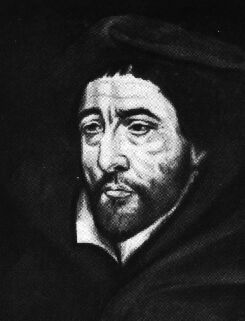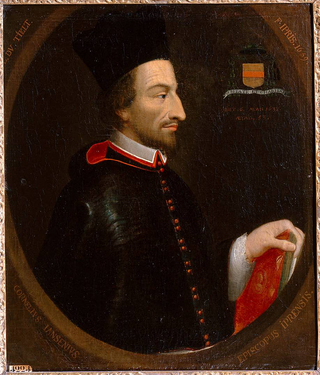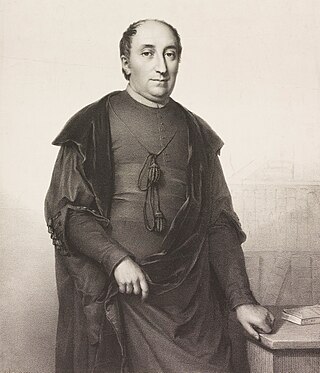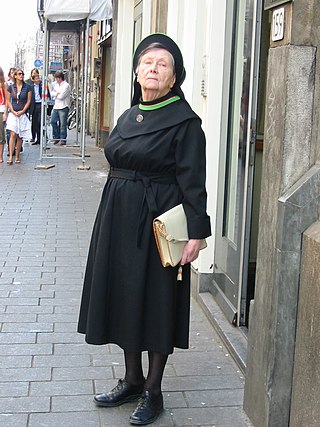
Leuven or Louvain is the capital and largest city of the province of Flemish Brabant in the Flemish Region of Belgium. It is located about 25 kilometres east of Brussels. The municipality itself comprises the sub-municipalities of Heverlee, Kessel-Lo, Leuven proper, Wilsele, Wijgmaal and part of Haasrode and Korbeek-Lo. It is the eighth largest city in Belgium, with more than 100,244 inhabitants.

Michael Baius was a Belgian theologian. He formulated the school of thought now known as Baianism.

The Catholic University of Leuven or Louvain was founded in 1834 in Mechelen as the Catholic University of Belgium, and moved its seat to the town of Leuven in 1835, changing its name to Catholic University of Leuven. In 1968, it was split into two universities, the Katholieke Universiteit Leuven and the Université catholique de Louvain, following tensions between the Dutch and French-speaking student bodies.

Cornelius Jansen was the Dutch Catholic bishop of Ypres in Flanders and the father of a theological movement known as Jansenism.

Jean-Baptist David was a canon and professor of Dutch and history at the Katholieke Universiteit Leuven.

Matthias Edward Storme is a Belgian lawyer, academic and conservative philosopher.

Augustinian nuns are the most ancient and continuous segment of the Roman Catholic Augustinian religious order under the canons of contemporary historical method. The Augustinian nuns, named after Saint Augustine of Hippo, are several Roman Catholic enclosed monastic communities of women living according to a guide to religious life known as the Rule of St. Augustine. Prominent Augustinian nuns include Italian mystic St. Clare of Montefalco and St. Rita of Cascia.

Christian Lupus was a Flemish theologian and historian.
Marc Van Ranst is a Belgian public health physician and Professor of Virology at the Katholieke Universiteit Leuven and the Rega Institute for Medical Research. On 1 May 2007, he was appointed as Interministerial comissionar by the Federal Government of Belgium to prepare Belgium for an influenza pandemic.

Gustave Charles Sap was a Belgian politician and minister for the Catholic Party. Sap was also professor at the Catholic University of Leuven. During his professional career, he was active in the Flemish movement, agriculture and business. In 1920, he married Antoinette Gylsen, daughter of the Antwerp shipowner Henry Gylsen, and together they had five daughters and one son. Gustave Sap was the father-in-law of André Vlerick, Jan Piers and Albert De Smaele.
Hentenius was a Flemish Dominican Biblical exegete. He is well known for his edition of the Vulgate in 1547.

The Old University of Leuven is the name historians give to the university, or studium generale, founded in Leuven, Brabant, in 1425. The university was closed in 1797, a week after the cession to the French Republic of the Austrian Netherlands and the principality of Liège by the Treaty of Campo Formio.

Henri Maria Dymphna André Laurent "Rik" Torfs is a Belgian canon law scholar and media personality. He is a former Senator for the Christian Democratic and Flemish party in the Belgian Federal Parliament and a former Rector of the Catholic University of Leuven.

KU Leuven is a Catholic research university in the city of Leuven, Belgium.

The Old University of Leuven was established in 1425 with Faculties of Arts, Medicine, Law; however, the university did not have a Faculty of Theology initially. In 1426 a Faculty of Canon Law was added, and at that time both Law Faculties functioned together in one Collegium utriusque iuris.

St Gertrude's Abbey is a complex of former monastic buildings in Leuven, Belgium. An Augustinian priory founded in 1206 was suppressed in 1797. After restoration, the monastic buildings were used between 1917 and 1968 by Benedictine nuns as a house of studies and student residence.
Jan Van der Stock is a Belgian art historian and exhibition curator. He is a full professor at the University of Leuven, where he lectures on Medieval and Renaissance Arts, Graphic Arts, Iconography, Iconology, and Curatorship. He is the director of Illuminare – Centre for the Study of Medieval Art and holder of the Van der Weyden Chair – Paul & Dora Janssen, the Veronique Vandekerchove Chair of the City of Leuven and the Chair of Medieval Sculpture in the Low Countries. Jan Van der Stock was the husband of Prof. dr. Christiane Timmerman and is the father of Willem and Liza Van der Stock.
Luc Sels is a Belgian sociologist.
Herman Frans Anna baron Van der Wee is a Belgian economic historian. He was a full professor of social and economic history at the KU Leuven from 1969 to 1993. The academic output of Van der Wee spans economic history, the history of banking, financial history. He has performed research on the period from the Middle Ages to the present time. Geographically he has performed broad research as well, looking into Antwerp, Belgium, the Low Countries, Europe and the world.
Raymond van Uytven was a Belgian medievalist, a specialist in the economic and urban history of the medieval Duchy of Brabant, who was a professor at the University of Antwerp and the University of Leuven.













